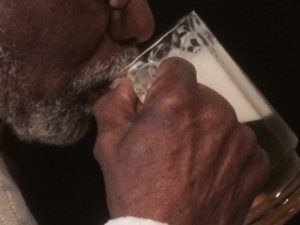 Despite the common perception that moderate alcohol intake is good for the heart, new research suggests long-term alcohol consumption, even as little as one drink a day may enlarge the heart’s atrium and increase the risk of developing atrial fibrillation, according to new research in the Journal of the American Heart Association.
Despite the common perception that moderate alcohol intake is good for the heart, new research suggests long-term alcohol consumption, even as little as one drink a day may enlarge the heart’s atrium and increase the risk of developing atrial fibrillation, according to new research in the Journal of the American Heart Association.
“Our study provides the first human evidence of why daily, long-term alcohol consumption may lead to the development of this very common heart rhythm disturbance,” says senior study author, Gregory Marcus, associate professor of Medicine specialising in Cardiac Electrophysiology at the University of California at San Francisco, USA. “We were somewhat surprised that a relatively small amount of alcohol was associated with a larger left atrium and subsequent atrial fibrillation.”
Researchers analysed data on 5,220 participants from the Framingham Heart Study, an ongoing national research project in the United States. Participants (54% women, average age 56) underwent electrocardiograms (EKG) to measure electrical activity of the heart. Of 17,659 EKG scans taken over six years, researchers detected 1,088 incidences of atrial fibrillation.
They also found:
- Chronic alcohol consumption was also associated with higher risk for incident atrial fibrillation.
- Every 10 grams per day of alcohol (one drink a day) consumed was associated with a 5% higher risk of developing new-onset atrial fibrillation.
- Every additional 10 grams of alcohol a day was linked to a 0.16 millimeter larger left atrium (one of the four chambers of the heart).
- Approximately 24%, and up to 75%, of the relationship between regular alcohol consumption and atrial fibrillation risk could be traced back to enlargement of the left atria.
Researchers said the relationship between atrial fibrillation and alcohol consumption remained even after considering other heart health risk factors, such as high blood pressure, diabetes, or smoking.
These observational findings do not suggest that drinking alcohol directly causes heart problems. However, researchers said their results question the popular consumer belief that alcohol benefits the heart.
“Our data suggest atrial fibrillation might be prevented by avoiding alcohol — however, just as alcohol likely has variable effects on individuals, there are almost certainly various mechanistic subtypes of atrial fibrillation. It is not one size fits all when it comes to the effects of alcohol and heart health,” Marcus says.
How regular alcohol consumption may be influencing the size of the left atria or the heart’s electrical activity is unclear and warrants further investigation. “Our hope,” Marcus says, “is that by understanding the mechanistic relationship between alcohol and atrial fibrillation we might learn something inherent to atrial fibrillation in general that could help identify new ways of understanding and treating the disease.”
The National Institute on Alcohol Abuse and Alcoholism of the National Institutes of Health and the National Heart, Lung and Blood Institute funded the study.









